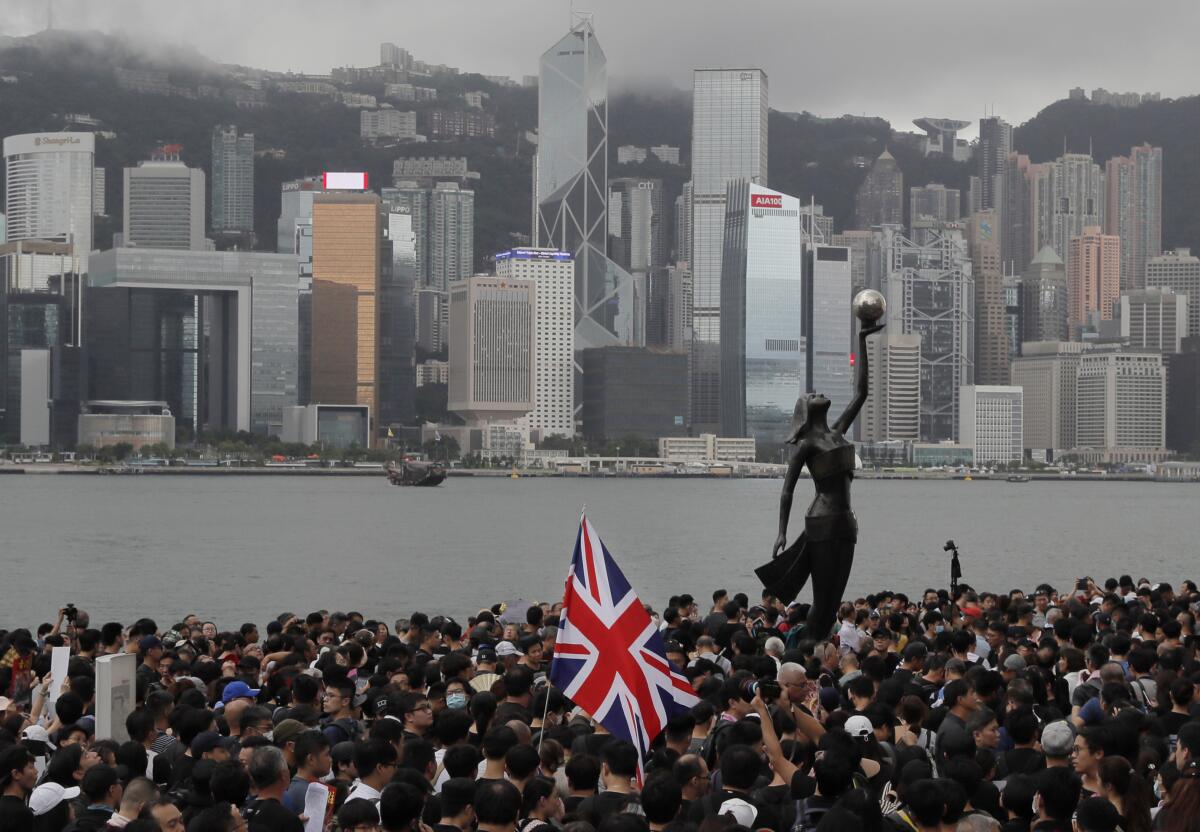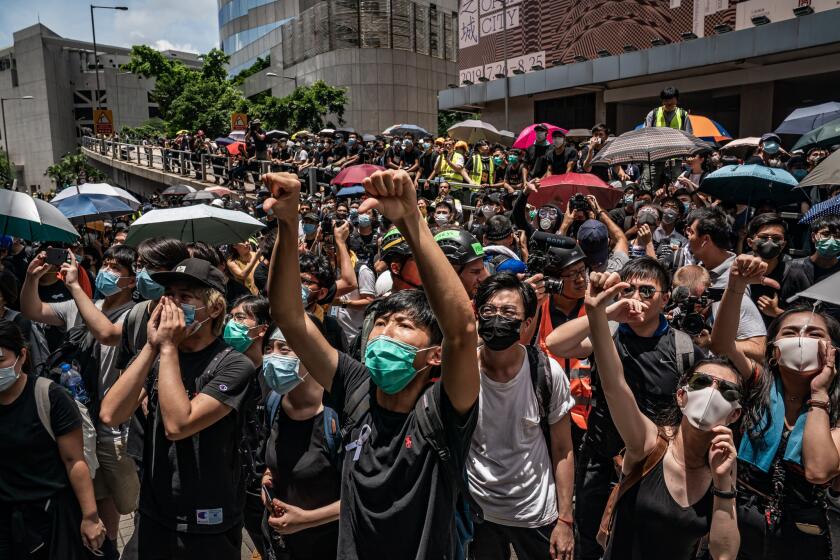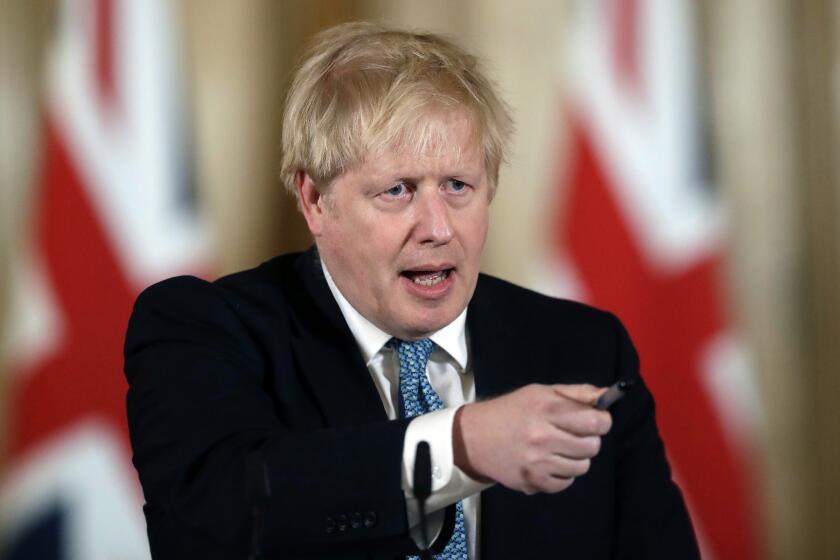Thousands flee Hong Kong for Britain amid Beijing crackdown, with many more expected

- Share via
HONG KONG — Thousands of Hong Kongers have already made the sometimes-painful decision to flee the city and move to Britain since Beijing imposed a strict national security law on their hometown last summer. Their numbers are expected to swell to the hundreds of thousands.
Some are leaving because they fear punishment for supporting the pro-democracy protests that swept the former British colony in 2019. Others say mainland China’s encroachment on their way of life and civil liberties has become unbearable, and they want to seek a better future for their children abroad. Most say they don’t plan ever to go back.
The moves are expected to accelerate now that 5 million Hong Kongers are eligible to apply for visas to Britain, allowing them to live, work and study there and eventually apply to become British citizens. Applications for the British National Overseas visa officially opened Sunday, though many have already arrived on British soil to get a head start.
The British government said some 7,000 people with British National Overseas passports — a travel document that Hong Kongers could apply for before the city was handed back to China in 1997 — have arrived since July on the previously allowed six-month visa. It estimates that more than 300,000 people will take up the offer of extended residency rights in the next five years.
“Before the announcement of the BNO visa in July, we didn’t have many inquiries about U.K. immigration, maybe less than 10 a month,” said Andrew Lo, founder of Anlex Immigration Consultants in Hong Kong. “Now we receive about 10 to 15 calls a day asking about it.”
Mike, a photojournalist who asked that only his first name be used for fear of official reprisal, said he plans to apply for the visa and move to Leeds, in northern England, with his wife and young daughter in April.
More than 50 opposition and pro-democracy figures in Hong Kong have been arrested in the latest sign of Beijing’s intolerance of political dissent.
His motivation to leave Hong Kong came after the city’s political situation deteriorated following the anti-government protests and he realized that the city’s police force was not politically neutral. The police have been criticized by pro-democracy supporters for brutality and the use of excessive force.
Mike said moving to Britain was important because he believed the education system in Hong Kong would be affected by the political situation and it would be better for his daughter to study in the U.K.
Lo said that, with the new visa, the barrier to entry to move to Britain has become extremely low, with no language or educational qualifications required. British National Overseas passport holders need only to prove that they have enough money to support themselves for six months and that they are clear of tuberculosis, according to the British government.
Currently, Lo assists three to four families a week in their move to the U.K. About 60% of those are families with young children, and the remainder are young couples or young professionals.
China is targeting government opponents through financial institutions using a draconian national security law that’s already led to U.S. sanctions.
Cindy, a businesswoman who also asked to be identified by only her first name, arrived in London last week.
In Hong Kong, the mother of two young children had a comfortable lifestyle. She owned several properties with her husband, and the business she ran was going well. But she made up her mind to leave it all behind because she felt that the city’s freedoms and liberties were eroding and she wanted to ensure a good future for her kids.
She said it was important to move quickly because she feared Beijing would soon move to halt the exodus.
British Prime Minister Boris Johnson said this week that the visa offer showed Britain to be honoring its “profound ties of history” with Hong Kong, which was handed over to China in 1997 on the understanding that the government in Beijing would retain the city’s democratic freedoms and much of its political autonomy for 50 years.
Tensions are growing between the U.K., Beijing. Britain’s Dominic Raab cites concerns over China’s new national security law and alleged abuse of the Uighur people.
Beijing on Friday said it would no longer recognize the British National Overseas passport as a travel document or form of identification and criticized Britain’s citizenship offer as a move that “seriously infringed” on China’s sovereignty. It was unclear what effect the announcement would have because many Hong Kongers carry multiple passports.
Beijing drastically hardened its stance on Hong Kong after the 2019 protests turned violent and plunged the city into a months-long crisis. Since the security law’s enactment last summer, dozens of pro-democracy activists have been arrested, and the movement’s young leaders have either been jailed or fled abroad.
Because the new law broadly defines acts of subversion, secession, foreign collusion and terrorism, many in Hong Kong fear that expressing any form of political opposition — even posting messages on social media — could land them in trouble.
“This is a really unique emigration wave — some people haven’t had time to actually visit the country they’re relocating to. Many have no experience of living abroad,” said Miriam Lo, who runs Excelsior UK, a relocation agency. “And because of the pandemic, they couldn’t even come over to view a home before deciding to buy.”
More to Read
Sign up for Essential California
The most important California stories and recommendations in your inbox every morning.
You may occasionally receive promotional content from the Los Angeles Times.
















